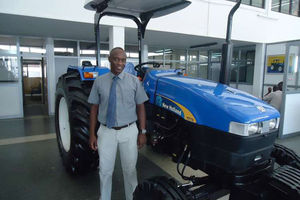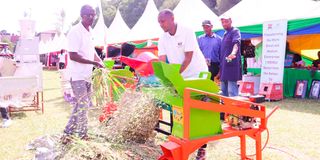
Elijah Mwangi (left), proprietor of Hopeite Machinery Company that fabricates agricultural machinery demonstrates with one of his staff Stephen Ndung'u how their new invented biogas-powered fodder chopper works during Nakuru Expo on June 4, 2025.
In Nakuru’s industrial area, sparks fly and metal meets metal. The rhythmic clang of measuring, cutting, welding, soldering, assembling, and painting fills the air as a group of young innovators craft machines designed to transform Kenya’s agricultural sector.
Elijah Mwangi, Stephen Ndung’u and Samuel Kamau co-founded Hopeite Machineries in 2014. None came from an agricultural or engineering background, but they shared a passion for innovation and a strong desire to tackle the persistent challenges facing Kenyan farmers.
Pooling their savings of Sh150,000, they kick-started informally before registering their business to design and produce affordable, durable agricultural machinery aimed at simplifying farm operations and enhancing productivity for small-scale farmers.
Today, they employ 19 skilled men and women in fabrication and assembly, producing a range of machines that have become essential tools for farmers throughout Kenya and beyond.
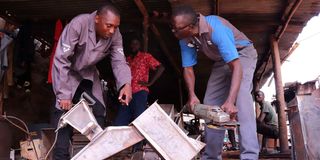
Stephen Ndung'u and Elijah Mwangi, both co-directors at Hopeite Machinery at their metal fabrication workshop in Nakuru on June 5, 2025.
“We began as a small workshop, recognising a market gap for accessible and practical farming equipment. Small-scale farmers face numerous challenges, particularly with post-harvest losses in grain handling and milling. At the same time, we aimed to create jobs for young people in Kenya,” says Mr Ndung’u.
Kenya’s agricultural sector underpins the livelihoods of over 70 per cent of the rural population and contributes roughly a third of the country’s GDP, yet, many small-scale farmers struggle with limited access to reliable and affordable machinery. Imported equipment often comes with high costs, maintenance challenges, and is frequently unsuited to local farming conditions.
Fabricating machines locally
The company bridges this gap by fabricating machines locally, with prices starting as low as Sh1,000 for simple tools and going up to over Sh1.2 million for more advanced equipment, each backed by a one-year warranty.
Production begins with iron, their main raw material, which they source from hardware stores. The process involves press braking and cutting, integrated with design. This is followed by fabrication, where the parts are assembled into the main product, and finally, painting.
“Producing locally instead of importing gives a real sense of pride. “Made in Kenya" means more than just a label, and local manufacturing requires stronger support and empowerment,” he says.
Traditional farming methods such as chopping fodder with a machete, shelling maize by pounding it in sacks, or manually removing maize husks are rapidly becoming a thing of the past. These tasks are now performed by efficient, durable machines that are making farmers’ lives easier.
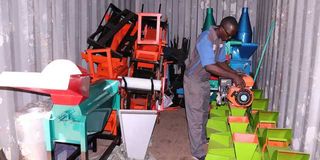
Elijah Mwangi, a co-founder at Hopeite Machinery, inspects some of their finished products in storage at the Hopeite yard at Kolen, Nakuru West sub-county, on June 5.
Hopeite’s product range includes posho mills, maize hullers, maize shellers, feed mixers, roller mills, and chaff cutter choppers, each carefully designed to be reliable, efficient, and easy to maintain.
“Our machines run on diesel, LPG gas, or biogas. This flexibility helps farmers reduce costs and adapt to available energy sources, including renewable options like biogas, which is important for sustainability,” he explains, adding that for many, these machines are game-changers, offering a pathway out of poverty and into more productive farming.
The company sources its raw materials from genuine suppliers, whom they consider partners. These close relationships allow for better negotiations, helping to reduce production costs. Most of their employees are trained on-site, enabling them to build local capacity and technical skills internally.
To ease the financial burden on small-scale farmers, the company has partnered with microfinance institutions and cooperatives to offer flexible payment plans and loans. These arrangements allow those without upfront capital to acquire machinery through affordable instalments while immediately benefiting from improved efficiency and output.
“This approach ensures that cost is not a barrier to adopting the tools needed for better farming,” he says, noting that such financing models are especially important in a context where access to credit remains limited for many rural producers.
He adds that they have also partnered with cooperatives involved in coffee farming to supply pulping machines. These cooperatives display the products on-site, making it easier for farmers to access and purchase them directly. Government subsidies also play a role in making their equipment more affordable and accessible. However, he points out that navigating bureaucratic processes can be a major challenge.
Marketplace demos
“In 2022, we received support from the Micro and Small Enterprises Authority (MSEA), which gave us a significant boost,” he shares.
From roadshows, marketplace demos, and expos to advertising on vernacular radio stations, they use diverse marketing strategies to reach farmers in rural areas.
The company has local stockists in seven counties nationwide and has successfully tendered to county governments. Its impact extends beyond Kenya’s borders, having exported equipment to neighbouring countries, including South Sudan, Ethiopia, and Somalia, through the FAO.
“Expanding regionally is part of our vision to support food security and rural development beyond our borders. We are proud that Kenyan innovation is contributing to the growth of agriculture across the region,” he adds.
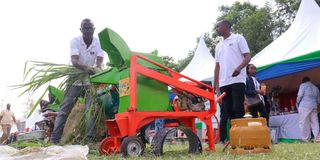
Elijah Mwangi (left), proprietor of Hopeite Machinery Company that fabricates agricultural machinery demonstrates with one of his staff Stephen Ndung'u how their new invented biogas-powered fodder chopper works during Nakuru Expo on June 4, 2025.
This regional presence also points to the country’s role as a manufacturing hub in East Africa and reflects the important role of small and medium-sized enterprises (SMEs) in driving economic integration.
They are also challenging outdated perceptions about Kenya’s informal manufacturing sector. Often stereotyped as low-quality and unregulated, this Jua Kali sector is a hotbed of innovation and skilled craftsmanship that sustains much of Kenya’s manufacturing.
“We want to show that artisans in this sector can produce high-quality, impactful products. It is about transforming a part of the economy that has been underestimated for too long.”
However, it has not been all smooth sailing. Accessing sufficient capital to scale production, sourcing consistent quality raw materials, and educating farmers on the use and benefits of their machinery have all been significant challenges.
“Every obstacle has been an opportunity to learn and grow. Investment in research and development ensures keeping pace with evolving agricultural needs and technology, while customer feedback drives consistent product improvement. Our goal remains improving the lives of farmers and creating jobs for young people,” he says.
The work of Hopeite Machineries fits into Kenya’s “Big Four Agenda,” which prioritises food security, manufacturing growth, and job creation.
Localising agricultural machinery production, the company reduces reliance on imports, cuts farming costs, and strengthens local supply chains, which are key components of economic resilience.
The company is integrating technology into its production through Computer Numerical Control (CNC) and is preparing to launch solar-powered kiosks aimed at mama mbogas, who play a crucial role in Kenya’s food distribution chain. These kiosks will provide reliable solar energy for refrigeration and lighting, reducing food spoilage and extending operating hours for vendors, thus supporting the entire agricultural ecosystem from farm to market through sustainable and innovative solutions.
As Kenya’s population grows and urbanises, the increasing demand for food and efficient agricultural systems emphasises the important role of local SMEs in driving sustainable development and supporting national priorities.


